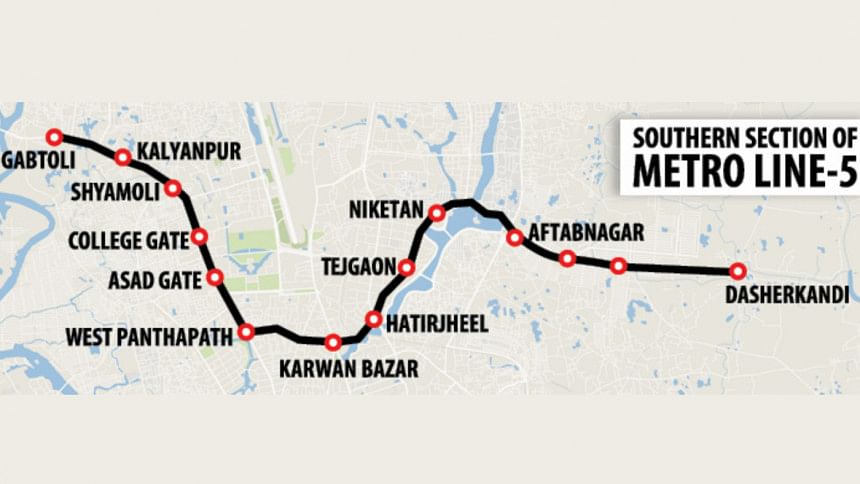Another MRT line in the offing

The government yesterday signed a loan agreement with the Asian Development Bank to get the long-cherished MRT Line-5 (southern route) project going.
The Manila-based multilateral lender will provide $33.26 million of the $44.58 million needed to conduct detailed feasibility studies, engineering designs, and procurement documentation for the 17.4km line; all of which is expected to be done by 2023.
Bangladesh will foot the remaining $11.32 million needed for the purpose.
Interest rate for the loan will be 2 percent and the amount will be repaid in 25 years after a five-year grace period. MRT Line-5 is one of the three high-priority lines in the capital planned for completion by 2030. The Line-5 is estimated to cost $2.5 billion and subsequent ADB financing will be sought.
The metro rail line would connect Gabtoli in the West and Dasherkandi in the East. It would enable passengers to transfer to other MRT lines and bus rapid transit connecting the north and the south.
Almost 13km of the line, including 12 stations, would be underground and the rest would be elevated with four stations.
“If the projects are ready and we finance them, they can be contracted as soon as they are approved, signed and committed, and the government does not have to pay unnecessary commitment charges,” said Manmohan Parkash, country director of ADB, during the agreement signing ceremony at the planning ministry.
Executive Committee of the National Economic Council in October approved the northern route of Line-5 -- from Hemayetpur of Savar to Bhatara via Gabtoli, Mirpur, and Gulshan with an estimated cost of Tk 41,238.55 crore.
The 20km line will consist of underground and elevated sections and is expected to be complete by 2028.
The Japan International Cooperation Agency will provide the lion’s share of the costs in soft loans, according to planning ministry officials.
The loans will carry an interest rate of 0.9 percent and must be paid back in 30 years with a grace period of 10 years. This is the lowest interest rate for Bangladesh yet.
The Dhaka Mass Rapid Transit Line 1 from Hazrat Shahjalal International Airport to Kamalapur Railway Station also got the nod in October.
This line, expected to cost Tk 52,561.43 crore, will be the country’s first underground metro line.
The 31.24km route will have an elevated section from Notun Bazar to Purbachal and is expected to be complete by 2026.
Work on MRT Line-6, between Uttara and Motijheel, began in July 2016 and as of September has made 30.05 percent progress. The line is expected to be opened on the golden jubilee of Bangladesh’s Liberation War victory, December 16, 2021.
Once completed, the 20.10km metro rail service with 16 stations will be capable of carrying 60,000 passengers an hour, reducing travel time from Uttara to Motijheel from at least two hours to less than an hour.
The authorities have recently decided to extend the Line-6 from Motijheel to Kamalapur Railway Station to help travellers depart and arrive at the country’s prime railway station.
“Dhaka city deserves a modern communication network to improve living quality, reduce traffic jams and improve productivity and environment,” Parkash said, adding that the MRT system will help raise Dhaka’s share of contribution to the economy from the existing 35 percent.
Metro rail is an essential conduit for a populous city like Dhaka and is a precursor to Bangladesh’s vision of becoming a developed country by 2041, he added.
The Dhaka MRT system is one of the mega-projects of the current Awami League and is expected to be fully functional by 2030, easing the capital’s two conundrums: congestion and pollution.
The MRT Line-5 would be designed with measures for climate and natural disaster resilience, and integrate features to help women, children, the elderly, and people with disabilities.
It would have automated ticketing and fare collection system.
The government yesterday signed another loan agreement (worth around $300 million) with the ADB for building 40km of power transmission lines and 4,450 megavolt-ampere (MVA) substations in Dhaka, as well as 368km of transmission lines, 3,070 MVA substations, and 20 bay extensions in the western zone.
It will also establish an enterprise resource planning system and introduce drones to improve the operational efficiency and safety of the Power Grid Company of Bangladesh.
The government and PGCB will contribute $249.25 million equivalent for the $750 million project due for completion at the end of June 2024.
“Upgrading and expanding the transmission network is crucial to improve power supply efficiency after significant improvement in power production in Bangladesh,” Parkash said, adding that the project will help achieve the government target of electricity for all by 2021.
Monowar Ahmed, secretary of the Economic Relations Division (ERD), and Parkash signed the agreements on behalf of Bangladesh and the ADB.

 For all latest news, follow The Daily Star's Google News channel.
For all latest news, follow The Daily Star's Google News channel. 



Comments